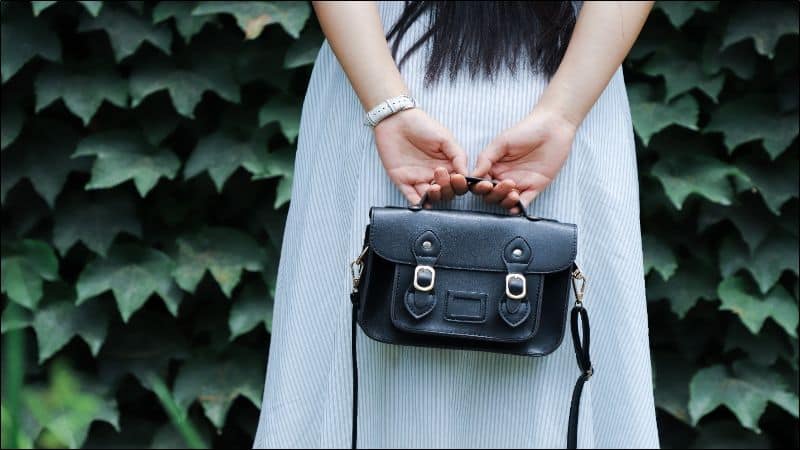If you’re someone who carries a purse, you’ve probably experienced the discomfort of a heavy bag. But just how much does a purse weigh on average? The answer is not so simple, as the weight of a purse can vary greatly depending on its size, material, and contents.
Understanding purse weight is important for a number of reasons. Carrying a heavy bag can lead to shoulder, neck, and back pain, as well as poor posture. In some cases, it can even cause nerve damage or chronic pain. So, whether you’re someone who carries a lot of items or just a few essentials, it’s important to choose a bag that won’t weigh you down.
Key Takeaways
- The weight of a purse can vary greatly depending on its size, material, and contents.
- Carrying a heavy bag can lead to shoulder, neck, and back pain, as well as poor posture.
- Choosing a lighter bag can help prevent the negative health effects of a heavy purse.
Understanding Purse Weight

When it comes to purses, weight is an important factor to consider. Carrying a heavy purse can cause strain on your neck, shoulders, and back, leading to pain and discomfort. It’s essential to understand how much a purse weighs before purchasing one.
The weight of a purse can vary depending on its size, design, and materials. A small clutch purse may only weigh a few ounces, while a large tote bag can weigh several pounds. Generally, the average weight of a purse is around six pounds My Accessories X.
It’s important to note that the weight of your purse should not exceed 10% of your body weight Marie Claire. For instance, if you weigh 150 pounds, your purse should not weigh more than 15 pounds.
When shopping for a purse, consider the following factors to help you find a lightweight option:
- Material: Choose purses made from lightweight materials such as nylon, canvas, or leather.
- Size: Opt for smaller purses that can fit your essentials without adding unnecessary weight.
- Straps: Look for purses with adjustable straps that allow you to distribute the weight evenly across your body.
- Organization: Choose purses with multiple compartments to help you organize your belongings and distribute the weight evenly.
In conclusion, understanding the weight of a purse is crucial to avoid discomfort and pain. Consider the factors mentioned above when shopping for a lightweight purse that suits your needs.
Types of Bags and Their Average Weights
https://www.youtube.com/watch?v=P2S9fNYVN6g&embed=true
When it comes to choosing a purse, there are many different types of bags to consider. Each type has its own unique features and characteristics, including its weight. Here’s a breakdown of some popular types of bags and their average weights:
Handbags
Handbags are a classic choice for many women. They come in a variety of sizes and styles, ranging from small clutches to large totes. On average, a handbag weighs between 1 and 2 pounds.
Wallets
Wallets are a must-have accessory for anyone who needs to carry cash, credit cards, and other important items. They are typically small and lightweight, weighing in at around 0.2 pounds on average.
Shoulder Bags
Shoulder bags are a popular choice for those who need to carry more than just the essentials. They typically have a longer strap that can be worn over the shoulder, making them easy to carry. On average, a shoulder bag weighs between 1 and 2 pounds.
Tote Bags
Tote bags are a versatile option that can be used for a variety of purposes, including as a work bag or a beach bag. They are typically larger than other types of bags, and can weigh anywhere from 1 to 3 pounds on average.
Cross-Body Bags
Cross-body bags are a great option for those who need to keep their hands free. They typically have a long strap that can be worn diagonally across the body. On average, a cross-body bag weighs between 1 and 2 pounds.
Leather Handbags
Leather handbags are a popular choice for those who want a durable and stylish bag. They can come in a variety of styles, including totes, shoulder bags, and cross-body bags. On average, a leather handbag weighs between 1 and 3 pounds.
Remember, the weight of your bag will depend on its size, material, and the items you carry inside. If you’re concerned about the weight of your bag, consider choosing a smaller size or a lighter material.
The Impact of Purse Contents
The weight of your purse is not only determined by its size and material but also by its contents. The items you carry in your purse can add up quickly and make your purse heavy. Here are some common items and their approximate weights:
-
Essentials: Your wallet, phone, and keys are likely to be the heaviest items in your purse. A typical wallet weighs around 2-3 ounces, a phone weighs around 5-6 ounces, and keys weigh around 2-3 ounces. Therefore, carrying these essentials can add up to 10 ounces or more to your purse.
-
Makeup Bag: A small makeup bag can weigh around 5-6 ounces, and a larger one can weigh up to 1-2 pounds, depending on the number of items you carry. If you carry a large makeup bag, consider downsizing it to reduce the weight of your purse.
-
Water Bottle: A full water bottle can weigh around 16 ounces, and if you carry it in your purse, it can add a considerable amount of weight. Consider carrying a smaller water bottle or a reusable one that can be refilled.
-
Books and Magazines: If you carry books or magazines in your purse, they can add a significant amount of weight. A paperback book can weigh around 7-8 ounces, and a magazine can weigh around 4-5 ounces. Consider carrying a Kindle or e-reader instead of physical books to reduce the weight of your purse.
-
Snacks: If you carry snacks in your purse, they can add weight too. A small bag of chips can weigh around 1-2 ounces, and a candy bar can weigh around 2-3 ounces. Consider carrying a few healthy snacks like nuts or dried fruit instead of junk food to reduce the weight of your purse.
Carrying a heavy purse can have negative impacts on your body, including back pain, headaches, and poor posture. Therefore, it’s important to be mindful of the items you carry in your purse and try to keep it as light as possible.
The Effects of a Heavy Bag
« Purse Repair in Los Angeles: Get Your Favorite Bag Fixed Today!
Purse Repair in Chicago: Where to Get Your Favorite Bag Fixed »
Carrying a heavy purse can have negative effects on your body. When you overload your bag, the muscles in your spine have to work harder to offset the weight, which leads to more pressure on the lower back. As a result, you may experience back pain, stiffness, and decreased range of motion in your upper back.
If you carry your bag on one side of your body, it can cause your posture to become unbalanced. This can lead to a condition known as military neck, where the natural curve in your neck decreases. This can cause stiffness and discomfort in the neck area.
In addition to affecting your posture, carrying a heavy bag can also affect how you walk. A small study found that habitually carrying your bag on one side can cause you to compensate by leaning to one side, leading to an uneven gait.
To prevent these negative effects, it’s important to choose a bag that is appropriately sized for your needs and to regularly clean out any unnecessary items. Experts recommend that your bag should not weigh more than 10% of your body weight. If you need to carry more than that, consider using a backpack or a rolling bag to distribute the weight more evenly.
In summary, carrying a heavy bag can have negative effects on your body, including back pain, posture issues, and decreased range of motion. To avoid these issues, choose a properly sized bag and distribute the weight evenly.
Body Weight and Purse Weight: Is There a Connection?
Carrying a purse is a daily necessity for many women. But did you know that the weight of your purse can have an impact on your body? According to experts, there is a connection between your body weight and the weight of your purse.
The rule of thumb is that your purse should never exceed 10% of your body weight. This means that if you weigh 140 pounds, your purse should be no more than 14 pounds. Ideally, it should be even lighter, around 5% of your body weight.
Carrying a heavy purse can cause unnecessary pain and discomfort. It can put pressure on your lower back and cause muscles in your spine to work harder to offset the weight. This can lead to neck and shoulder pain, headaches, and even posture problems.
To avoid these issues, it’s important to choose a purse that is the right weight for your body. Consider a cross-body bag, which is slightly better than a shoulder bag, as it distributes the weight more evenly across your body. You can also try to minimize the number of items you carry in your purse to reduce its weight.
In summary, the weight of your purse is directly related to your body weight. To avoid pain and discomfort, it’s important to choose a purse that is the right weight for your body and to limit the number of items you carry. Remember the rule of thumb: your purse should never exceed 10% of your body weight.
The Two-Pound Rule for Purses
https://www.youtube.com/watch?v=kVri_SBIEWU&embed=true
When it comes to purses, there is a general rule of thumb that many experts suggest following: the two-pound rule. This rule suggests that an ideal purse should weigh no more than two pounds when empty. This weight takes into account the fact that you will be adding items to your purse, such as your wallet, phone, keys, makeup, and other essentials.
Why is the two-pound rule important? Carrying a heavy purse can put unnecessary strain on your shoulders, neck, and back, leading to pain and discomfort. In fact, physiologist Sammy Margo found that the weight of a woman’s purse can range from 8 to 22 pounds, which can have extreme effects on the body.
While the two-pound rule may seem restrictive, it is important to remember that this weight limit is for your own well-being. It is easy to accumulate unnecessary items in your purse, but by keeping it light, you are doing your body a favor. Additionally, a lighter purse can be more comfortable to carry and can help prevent shoulder and back pain.
Of course, there may be times when you need to carry more items, such as when traveling or running errands. In these cases, it is important to be mindful of the weight of your purse and to try to distribute the weight evenly across your body. You can also consider using a backpack or cross-body bag, which can help distribute the weight more evenly.
In summary, the two-pound rule for purses is a helpful guideline to follow for your own well-being. By keeping your purse light, you can prevent unnecessary pain and discomfort and make carrying your essentials more comfortable.
Health Implications of a Heavy Purse
https://www.youtube.com/watch?v=NyTmBDXy_9s&embed=true
Carrying a heavy purse can have negative consequences on your health. Here are some of the health implications of carrying a heavy purse:
Neck and Shoulder Pain
When you carry a heavy purse, the weight of the purse can cause your neck and shoulder muscles to strain. This can lead to neck and shoulder pain, which can be quite uncomfortable.
Back Pain
Carrying a heavy purse can also cause back pain. When you carry a heavy purse on one shoulder, it can cause your spine to curve unnaturally, which can lead to back pain.
Headaches
Studies show that carrying a heavy purse can even lead to headaches. The weight of the purse can cause tension in your neck and shoulder muscles, which can lead to headaches.
Numbness and Tingling
When you carry a heavy purse on one shoulder, it can cause nerve compression. This can lead to numbness and tingling in your arms and hands.
Poor Posture
Carrying a heavy purse can cause you to adopt poor posture. When you carry a heavy purse on one shoulder, it can cause you to lean to one side, which can lead to poor posture.
Tips for Carrying a Healthy Purse
To avoid the negative health implications of carrying a heavy purse, here are some tips for carrying a healthy purse:
- Choose a purse that is lightweight
- Only carry the essentials in your purse
- Switch shoulders frequently to avoid muscle strain
- Use a backpack or cross-body bag to distribute weight evenly
- Consider using a rolling bag for heavier items
By following these tips, you can avoid the negative health implications of carrying a heavy purse and keep your body healthy.
Choosing a Lighter Bag
https://www.youtube.com/watch?v=VT1snPnXn3M&embed=true
When it comes to choosing a purse, weight is an important factor to consider. A heavy bag can cause strain on your shoulders and back, leading to discomfort and even pain. Here are some tips to help you choose a lighter bag:
Material Matters
The material of your purse can have a significant impact on its weight. Leather bags, for example, tend to be heavier than those made from nylon or canvas. If you’re looking for a lightweight option, consider bags made from lightweight materials such as nylon, canvas, or even recycled materials.
Size Matters
The size of your purse can also affect its weight. Larger bags tend to be heavier than smaller ones, so consider downsizing if you don’t need to carry a lot of items. Additionally, look for bags with multiple compartments to help you organize your belongings and distribute weight evenly.
Be Selective
Take a look at what you carry in your purse on a daily basis and consider if you really need all of those items. The more you carry, the heavier your purse will be. Consider carrying only the essentials, such as your phone, wallet, and keys, and leaving the rest at home.
Look for Lightweight Features
Some bags come with features that can help reduce weight. For example, bags with adjustable straps can be worn cross-body to distribute weight evenly, while bags with padded straps can provide extra comfort. Additionally, look for bags with lightweight hardware, such as zippers and clasps, to further reduce weight.
By considering the material, size, and features of your purse, you can find a lighter bag that won’t weigh you down.
The Role of Beauty in Purse Selection
When it comes to selecting a purse, there are many factors to consider, and beauty is certainly one of them. After all, you want to carry a purse that looks good and complements your outfit. However, it’s important to not let beauty be the only factor in your decision-making process.
While a beautiful purse can elevate your style, it’s also important to consider the functionality of the purse. A purse that is too small or doesn’t have enough compartments to keep your belongings organized can be frustrating to use, no matter how beautiful it is. On the other hand, a functional purse that doesn’t fit your personal style may not make you feel confident and put-together.
When selecting a purse, it’s important to strike a balance between beauty and functionality. Look for purses that have both attractive design elements and practical features, such as multiple compartments, adjustable straps, and durable materials. Consider the occasions when you’ll be using the purse and choose one that fits the dress code and your personal style.
Remember that beauty is subjective and what looks good to one person may not appeal to another. Don’t be afraid to choose a purse that speaks to your personal taste, even if it’s not considered “trendy” or “fashionable” by others. Ultimately, the most important thing is that you feel confident and comfortable carrying your purse.
Purse Weight and Women: A Closer Look
https://www.youtube.com/watch?v=J14YVp36U7I&embed=true
As a woman, you likely carry a purse with you wherever you go. But have you ever stopped to consider how much your purse weighs? The weight of a purse can have a significant impact on your overall health and well-being, causing pain and discomfort in your back, neck, and shoulders.
Experts recommend that the ideal weight for a purse is two pounds or less. However, many women carry purses that weigh much more than this, often without realizing the potential harm they are causing to their bodies.
Carrying a heavy purse can cause a range of health problems, including back pain, neck pain, shoulder pain, and headaches. Over time, these problems can become chronic, leading to long-term health issues that can be difficult to manage.
To avoid these problems, it’s important to choose a purse that is both stylish and lightweight. Look for purses made from lightweight materials, such as canvas or nylon, and avoid heavy leather purses that can weigh several pounds.
In addition to choosing a lightweight purse, it’s also important to be mindful of what you carry inside it. Try to limit the number of items you carry with you, and avoid carrying heavy items such as books or laptops. Instead, opt for smaller items such as a wallet, phone, and keys.
By taking these simple steps, you can help protect your health and well-being while still enjoying the convenience and style of carrying a purse. So next time you reach for your purse, remember to consider its weight and make choices that will help keep you healthy and pain-free.
Frequently Asked Questions
https://www.youtube.com/watch?v=_xGpHqLskUA&embed=true
What is the typical weight of a purse?
The weight of a purse can vary greatly depending on the size, material, and contents. On average, a small purse may weigh around 0.5 to 1 pound (0.2 to 0.5 kg), while a larger handbag may weigh 2 to 3 pounds (0.9 to 1.4 kg). However, it’s important to note that some purses can weigh much more than this, especially if they are made of heavy materials or contain a lot of items.
How heavy should a crossbody bag be?
A crossbody bag is designed to be worn across the body, which can help distribute the weight more evenly and reduce strain on your shoulder. Ideally, a crossbody bag should weigh no more than 10% of your body weight. For example, if you weigh 150 pounds, your crossbody bag should weigh no more than 15 pounds.
What is considered a heavy purse?
A heavy purse is one that weighs more than 10% of your body weight. Carrying a heavy purse can put a lot of strain on your shoulder and back muscles, which can lead to pain and discomfort. If your purse feels heavy, it’s a good idea to lighten the load by removing any unnecessary items.
How much does an empty handbag weigh?
The weight of an empty handbag can vary depending on the size and material. On average, a small handbag may weigh around 0.5 to 1 pound (0.2 to 0.5 kg), while a larger handbag may weigh 1 to 2 pounds (0.5 to 0.9 kg). However, it’s important to note that some handbags can weigh much more than this, especially if they are made of heavy materials.
What is the weight limit for shipping a purse?
The weight limit for shipping a purse can vary depending on the shipping carrier and the destination. In general, most carriers have a weight limit of 70 pounds (31.8 kg) for packages. However, it’s important to check with the carrier for their specific weight limits and shipping guidelines.
What is the average weight of a handbag in kilograms?
The average weight of a handbag can vary depending on the size and material. On average, a small handbag may weigh around 0.2 to 0.5 kilograms, while a larger handbag may weigh 0.9 to 1.4 kilograms. However, it’s important to note that some handbags can weigh much more than this, especially if they are made of heavy materials.
















